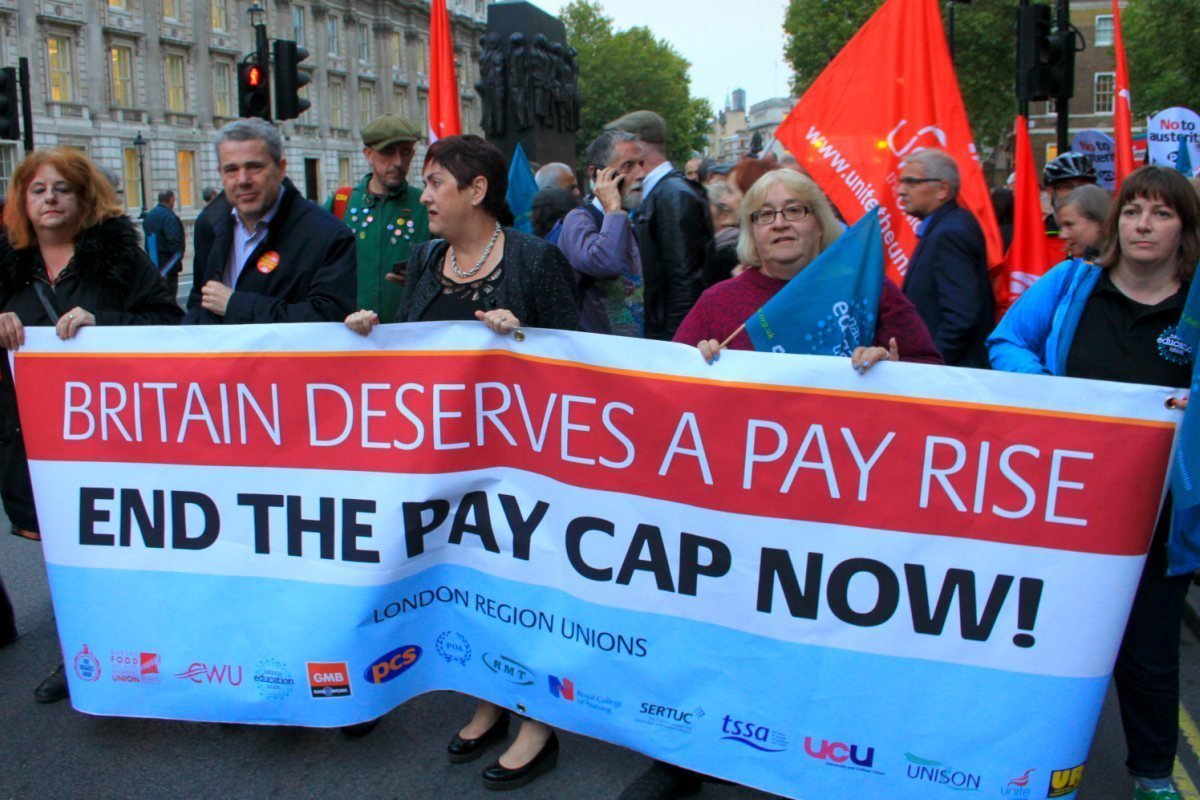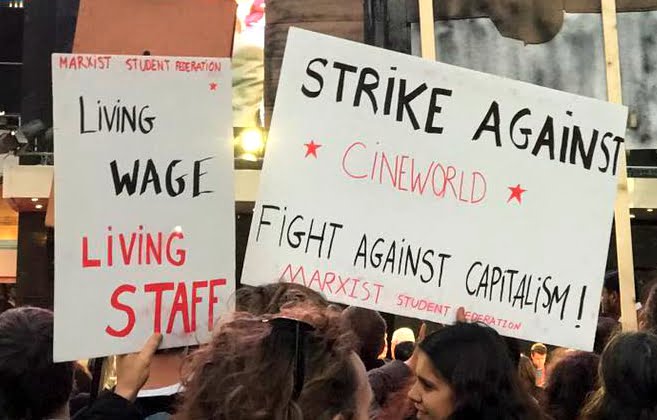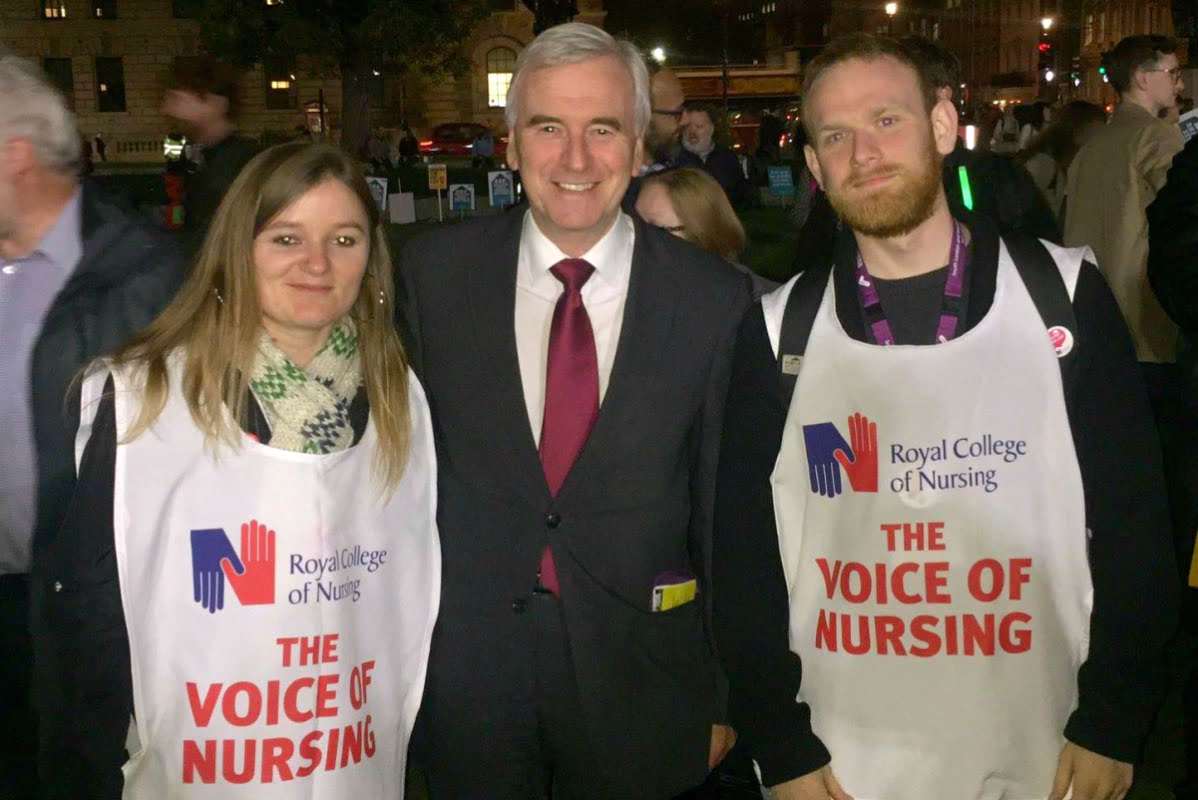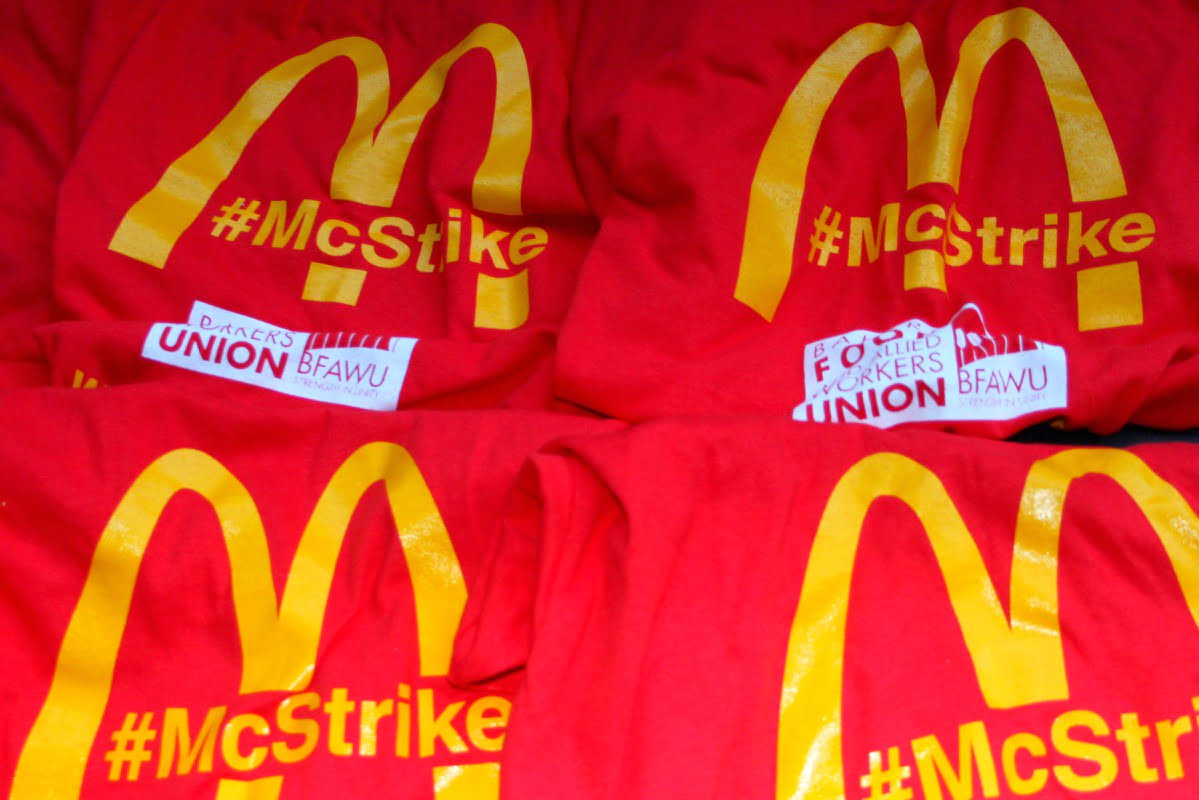The last week has seen a number of protests taking place in the fight against low pay: from a TUC demonstration against the public sector pay cap, to the continuing struggle of the Picturehouse cinema workers in their demand for a London living wage. We provide here a series of reports from Socialist Appeal supporters on the various struggles taking place in the fight for decent pay.
The last week has seen a number of protests taking place in the fight against low pay.
On Tuesday, the TUC organised a rally in Westminster to demonstrate against the public sector pay cap and highlight the low pay scandal in firms such as McDonald’s, where workers have organised and taken strike action in demand of a living wage.
Elsewhere, strikes have taken place over the last week at Picturehouse cinemas across London, with cinema workers demanding the London living wage. These strikes culminated in a high profile protest at the BFI Film Festival on Sunday 15th October.
We provide here a series of reports from Socialist Appeal supporters on the various struggles taking place in the fight for decent pay – amongst the nurses, Picturehouse workers, and wider trade union movement.
TUC protest says: Britain needs a pay rise! Scrap the cap!
By Steve Jones
Hundreds of trade unionists marched through London on Tuesday evening (17th October) as part of the TUC campaign against the pay cap and low pay in the public sector (and beyond).
Union members had been lobbying their MPs during the day and later joined the marchers at a rally in Parliament Square.
The protest was taking place against the background of the announcement of the latest set of figures dealing with the economy and the workplace. With inflation now officially at 3% (and likely to rise) and average pay rises remaining at 2.1%, the reality is that in real terms pay is continuing to fall.

All estimates point to this gap continuing for sometime yet. Even the relaxation of the public sector pay gap is not expected to reverse this process of pay decline. Many sectors are now starting to find themselves falling into the low pay trap. For example, large numbers of supply teachers are now having to quit the profession as changes to contracts and the increased use of the “umbrella” company scam means that they are simply not earning enough to live on.
The Low Pay Commission has noted that at least 580,000 workers in Britain are not even getting the legal minimum wage. Earlier, the marchers, who had assembled opposite 10 Downing Street, heard speeches from trade unionists, Kate Osamor MP and a particularly fiery speech from a McDonald’s striker from the BFAWU (bakers and food workers union), showing the way forward.
Many of the speakers praised Jeremy Corbyn and the Labour front bench for their positive stance. This needs to be developed, with the affiliated unions pushing forward to back Corbyn and demand left policies. Those unions which are not affiliated to the Labour Party must now take urgent action to affiliate and play their part in continuing the transformation of Labour into a party that in office will defend the working class.
Whilst many on the march welcomed the TUC campaign, they also made clear that protesting and lobbying is not nearly enough – militant action is needed to defeat the scandal of low pay and the ongoing attacks of the capitalist system. Union leaders have said they will be calling for strike action – these words must become facts.
Picturehouse strikes and protests continue the struggle for a living wage
By Daniel Morley
 On Sunday 15th October there was a huge demonstration in Leicester Square organised by striking Picturehouse workers. As reported previously, the strike campaign of these cinema workers is now in its second year. They are fighting for a living wage, maternity pay and other key demands.
On Sunday 15th October there was a huge demonstration in Leicester Square organised by striking Picturehouse workers. As reported previously, the strike campaign of these cinema workers is now in its second year. They are fighting for a living wage, maternity pay and other key demands.
This protest was preceded by five days of action at London Picturehouse cinemas to coincide with the London Film Festival, organised by the British Film Institute (BFI), who are using Picturehouse and Cineworld cinemas to host films. One aim of the strike is to shame BFI and try to grab publicity by holding strikes during key events like this.
We spoke to one of the strike’s leaders at Hackney Picturehouse, who told us that although the strike has been a long and hard struggle, they are gaining momentum. As they gather more publicity, more punters boycott the cinema in solidarity and more workers are on the picket lines.
It is clear that the anti-trade union laws passed by Thatcher, which a future Labour government must overturn, make this harder, because it is illegal for the picket to block the cinema’s entrance – despite that being the whole point of the picket. Nevertheless, the workers did an excellent job of making entry to the cinema difficult for customers.
The strike needs to be expanded if it is to win. They need to win over newly employed workers as quickly as possible – on strike days the cinemas were just kept open by new workers who were largely unaware of the strike. The workforce is very precarious and fluid.
Picturehouse, which is owned by Cineworld, has now threatened all the striking workers with the sack! The strongest defence against this would be the recruitment of all new workers into the strike.
They also need to win over Cineworld workers, who are on similarly bad pay and conditions. They are in touch with some Cineworld workers and the potential to expand the strike into the entire Cineworld chain is there, which would bring victory much closer.
Sunday’s demo was therefore very important – by pooling all the striking workers in a high profile central location outside the closing event of the festival, they bought themselves a lot of publicity. A few famous actors like Benedict Cumberbatch and Andy Serkis expressed their support.
About 70 people participated in the protest. Comrades from Socialist Appeal and the Marxist Student Federation participated in solidarity with the workers on strike and brought their own banners and signs with demands for better wages – and ultimately workers control – over Picturehouse.
The protesters tried to get close to the Odeon Cinema, where the final night of the BFI Festival was taking place. The mood among the protesters and especially the Picturehouse staff was very militant. There were successful attempts to block some of the entrances to the film festival which resulted in long queues at the entrances that remained open for the celebs and visitors to the event.
This strike has become a beacon for the growing number of young workers in precarious employment across Britain. It is a rank-and-file led struggle. They can win – and in doing so will show the way forward for those hundreds of thousands in similar conditions.
Report from the Picturehouse protest at the BFI London Film Festival
By Poppy Stockbridge, Ruth Hitchings, Vincent Groff
Around 5:30pm, protesters and striking workers marched into Leicester Square, site of the Closing Night Gala of the BFI’s London Film Festival. We crowded as close as we could get to the red carpet and the chanting began.
The UCL and LSE Marxist societies joined in solidarity with striking cinema workers from all over London to protest at the BFI’s patronage of the exploitative and bullying cinema chains, Picturehouse and Cineworld.
Both chains are owned by the second largest cinema operator in Europe, Cineworld Group plc. This company has consistently refused to pay the London Living Wage to its staff. Feeling the pressure, Cineworld bosses have resorted to the shameful and illegal practice of union-busting, including firing four Picturehouse union reps (in the BECTU trade union) on trumped up charges.
The angry cries of workers and protesters drowned out the broadcast of the gala across the square, and a large group of the public gathered to watch. After we realised that the camera was cutting our signs out of the shot, a group of comrades left the centre of the square to surround the red carpet to make our protest more visible.
Marxist students helped blockade the passage between the champagne reception, held at the Radisson Blu Edwardian Hampton Hotel, and the red carpet. Linking arms, we continued the chants and our presence caused the closure of that entrance.
Having succeeded in this, we attempted to return to the centre of the square. However, we were impeded by the BFI’s decision to close off the publically-owned square to non-ticket holders. Security guards were positioned at every gate, preventing us from re-joining the rest of the protesters.
Feeling the injustice of being prevented from entering a legal and peaceful protest, two brave comrades jumped the fence to continue the public protest.
The BFI should refuse to support companies such as Cineworld who mistreat their workers. And the whole of the labour movement, with the support of local communities and customers, should back the Picturehouse workers in their struggle for decent wages and conditions.
- Solidarity with the cinema workers!
- Boycott the Picturehouse!
- Unite and fight for a real living wage!
Nurses Scrap the Cap campaign: Don’t trust the Tories’ hollow promises
 By Dan Langley, RCN activist
By Dan Langley, RCN activist
On 10th October, Jeremy Hunt begrudgingly told nurses and other health workers that the pay cap is finally going to be scrapped for NHS staff. But, as you should always expect with the Tories, anything seemingly positive always comes with dodgy caveats.
On the same day, Hunt refused to say whether or not nurses’ pay would in fact match inflation and refused to state where the money would come from, hinting that it would have to come out of existing budgets. These budgets are already fixed way below what is needed for the well-funded, properly staffed and quality healthcare system that the working class deserve.
Theresa May then just echoed Hunt’s empty statement and again refused to give details. All this on top of new statistics released this week showing that inflation is now 3%, leaving the TUC and RCN fight for a mere 3.9% looking even more limited.
Since Jeremy Hunt’s speech, the RCN leadership have breathed a sigh of relief and have begun acting as if this is some sort of out-and-out victory. They haven’t seized on the opportunity to push the weak and pitiful Tories completely out of office, choosing instead to neuter themselves on the Tories behalf.
RCN general secretary, Janet Davies, correctly stated that scrapping the cap alone wasn’t enough – so why stop there? This was a missed opportunity to denounce the idea that the pay cap should only be lifted for NHS staff and not all public sector workers.
Industrial action is still at the forefront of the minds of many excellent trade union activists who fought all summer for better pay and safer staffing levels. The RCN should be using all of its resources to gear up for industrial action. This fight is needed not just for nurses but for all patients and for the future of the NHS, not least given that we don’t know what surprises Hammond’s November budget will hold.
We shouldn’t be retreating now. This fight is still to be won and must be won. Indeed, the real fight has barely began.
22nd November will be a decisive moment for the RCN, the trade union movement and the future of public sector pay. All eyes that day will be on the Chancellor’s Autumn Statement and what it means for public sector pay. All will be waiting for the nurses’ response. Let us not waste this opportunity.






